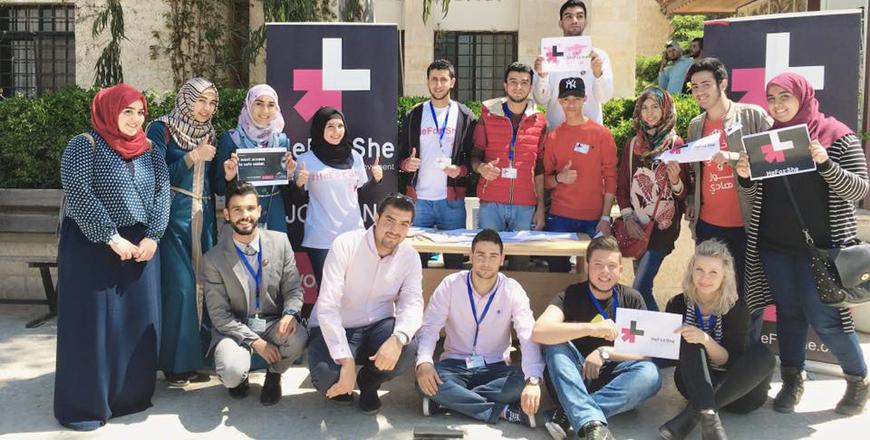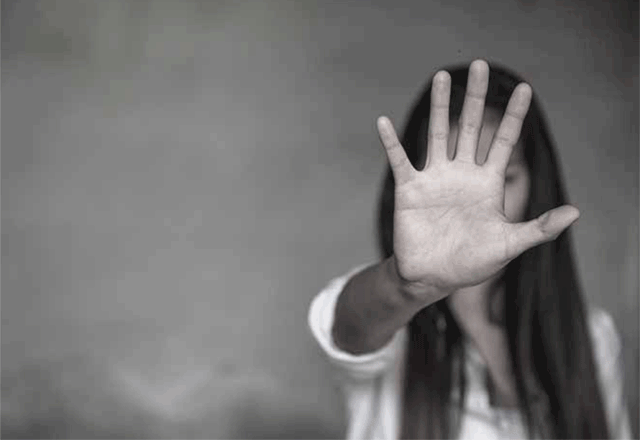You are here
‘Girls and women are afraid of speaking up due to stigma’
By Ana V. Ibáñez Prieto - Nov 26,2018 - Last updated at Nov 26,2018
AMMAN — “At that exact moment I only felt fear. I was young and I was locked in this man’s car, and the only thing I wanted was to leave — to be safe again,” 30-year-old political analyst Katrina Sammour told The Jordan Times on Sunday.
“Now, I look back and I only wish I had called the police, I wish I could have yelled at him, or did something to protect myself and make sure he’s punished for his behaviour,” Sammour said, recalling how she “froze” during the attack.
Sammour was recalling the day she was harassed by a taxi driver during her first year at university. Sammour’s experience is only one of the 16 stories that will be featured by the “#SpeakUpJo: 16 Voices on Sexual Harassment” social media campaign launched on Sunday.
The social media initiative was launched by the UN Population Fund (UNFPA) Jordan to mark this year’s 16 Days of Activism Against Gender-Based Violence campaign.
Running from November 25 to December 10, the social media campaign will showcase a total of 16 short videos featuring a personal story, anecdote or message about one of the various forms of sexual harassment present in the Kingdom.
“By sharing real stories from real people, this social media campaign aims to break the silence around sexual harassment in Jordan — empowering people to speak about it openly, placing the blame on the perpetrator and letting people know that it can happen to anyone, anywhere,” the UN agency said in a press release issued on Saturday.
“Girls fall victims to harassment at a young age and it continues to follow them throughout adulthood,” UNFPA gender-based violence expert Pamela Di Camillo told The Jordan Times recently. She warned that “instead of blaming perpetrators, this leads to families being hesitant to send girls to school or work and brings more confinement and denial into their lives”.
“Girls and women are afraid of speaking up due to the stigma that is placed on them, because of the way they act or dress, while perpetrators are not held accountable,” the expert continued, adding that, “even when they dare to report it, security authorities continue to dismiss cases”.
There is a need to encourage people to speak up and “stop saying this is a sensitive issue or a taboo” Di Camillo said, adding that work needed to continue at the institutional level.
“I spent so much time experiencing shame and guilt due to sexual harassment... don’t wait until you’re older to reclaim your life and power. Talk to your family, your friends and anyone you trust, and they will tell you that harassment is not a sin you have to bare,” Sammour said.
Sammour added that female victims of harassment or assault throughout the world tend to blame themselves.
“But our problem is not with the law,” Sammour stressed, pointing to girls’ — who are pressured by their families — unwillingness to press charges. “Before we talk about laws, we need to work on how we as a society can remove the stigma surrounding victims of sexual harassment,” she added.
Some men, like Laith Abu Taleb, Jordan coordinator of the HeForShe campaign for the promotion of gender equality, have also joined efforts to raise awareness on sexual harassment.
“Back when I was still in school, I used to constantly see this habit where after school, the male students would go directly to the girls’ school, and they would talk to them in an inappropriate way,” Abu Taleb recalled, elaborating on why he joined the HeForShe movement.
“We hope that, by inspiring people to speak up about sexual harassment, we can chip away at the culture of silence that so often surrounds this issue here in Jordan,” UNFPA Jordan Representative Laila Baker said.
In a similar vein, UN Women Jordan is currently welcoming all girls to share their stories on harassment on a new platform aimed at ending violence against women. The site, available at unwomen.org/mystory, seeks to “give voice to and amplify the voice of survivors and supporters around the world”, organisers said.
Related Articles
AMMAN — The country office of UN Women in Jordan has wrapped up the first phase of the global HeForShe campaign for the promotion of gender
The official definition of GBV is harmful acts directed at an individual based on gender. It is rooted in gender inequality, the abuse of power and harmful norms. Unfortunately, one in every three women worldwide is subjected to either physical and/or sexual abuse in their lifetime.
AMMAN — Confronting the phenomenon of sexual harassment in Jordan is a matter of high priority which needs to be addressed on a national lev













